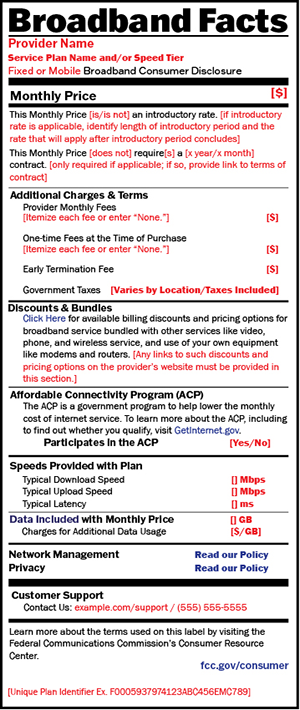Understanding the Broadband Facts Nutrition Label

Beginning in April 2024, you’ll probably start to see a new and rather official looking label on some marketing materials, advertising, and websites for broadband internet services.
Given the importance—and even necessity—of high-speed broadband internet to our economy and everyday lives, the government is now requiring a new consumer-friendly broadband service facts and information label to appear on certain internet service marketing materials.
Keep reading for answers to common questions and more information about these “broadband facts nutrition labels” that you will soon begin to see, including on DFN’s website, social media, and other materials that highlight our high-speed fiber internet services!
What exactly is the new broadband facts “nutrition” label?
Quite simply, the new broadband facts nutrition label is an-easy-to-read statement of basic information about available internet service that’s been recently mandated by the Federal Communications Commission (FCC) when broadband (high-speed) internet service providers advertise the sale of their services.
What is the purpose of the broadband facts labels?
Like other labels the government requires for many kinds of goods and services (including food ingredients, nutritional facts, and over-the-counter medication), the new broadband facts label provides essential information that consumers want to know before choosing a company to provide internet service.
Most importantly, the labels are designed to make it easier for you to compare competing internet service offerings—just like consumers do when choosing what type of breakfast cereal to purchase at the grocery store!
What information will be displayed on the new labels?
The labels contain the most pertinent information about internet service that customers need to make informed choices about their broadband options. Just by glancing at the new labels, you’ll more easily see distinctions between various services and plans, such as the price of monthly services, fees, and internet speeds offered by companies.
Specifically, the Broadband Facts label includes the following detailed information:
- The company name of the broadband internet service provider;
- Price per month;
- Whether the price is an introductory rate, and if so, the duration of that rate and what the new rate will be when the introductory rate expires;
- Whether the monthly price requires a contract, and if any, what the terms and duration of the contract are;
- Additional monthly fees and costs, and if any, an itemized list of each cost (e.g., required equipment rentals);
- Any one-time fees at the initiation of service, if any (e.g., installation fees, administrative fees, etc);
- Any early cancellation fees, if any;
- Taxes, if any (which will depend on local and state laws);
- Any discounts, including bundled service discounts (i.e., whether combining contracts for other company services like landline telephone service lowers the monthly costs of broadband service);
- Whether the company participates in the Affordable Connectivity Program, a government program that helps reduce internet service costs to qualified consumers;
- Typical download and upload speeds, and latency;
- Data information, including whether there’s any data cap and what price for any additional data exceeding that cap may be (if any); and
- Links to network management (e.g., content blocking) and company privacy policies, and customer support contact information.
What broadband-specific terms on the labels do I need to understand?
Most of the terms on the label can be easily understood, but some of the more techy-sounding terms might need a bit of an explanation. These include:
- Typical Download Speed: represents the generally-expected speed that internet data and information are downloaded from the internet into your home or office’s internet connection (the speeds for browsing the internet, streaming music/movies, etc.);
- Typical Upload Speed: represents the generally-expected speed that internet data and information are uploaded from the your home or office’s internet connection and sent back through the internet to others (the speeds for conducting a livestream, uploading photos/videos, etc.); and
- Typical Latency: represents the generally-expected amount of time it takes for internet data and information to transfer from one designated point to another (especially important for online gaming).
How will the information be presented—and why does that matter to me?
The information must be set forth in a standardized, uniform manner. That means that just about all labels will be structured nearly identically to make it easier for consumers to directly compare and contrast services and pricing from different companies.
The labels are particularly valuable to customers that have recently moved into a new area (and with internet service providers they may never have heard of before). And for consumers considering an upgrade to better internet, the labels help make the benefits of improved, faster broadband—like fiber internet—even more obvious.
At DFN we’re proud to offer the fastest, most reliable internet consumers can get—and at a fair and reasonable price. We’re confident that the forthcoming “broadband facts nutrition labels” will help make that even clearer to customers.
As always, should you have any questions about the labels, our products and services, or wish to upgrade your internet, feel free to reach out to the friendly and knowledgeable customer service representatives at DFN. And keep up with our social pages for more updates on our advanced fiber network!
by Andy Kovan DFN


Advertisement